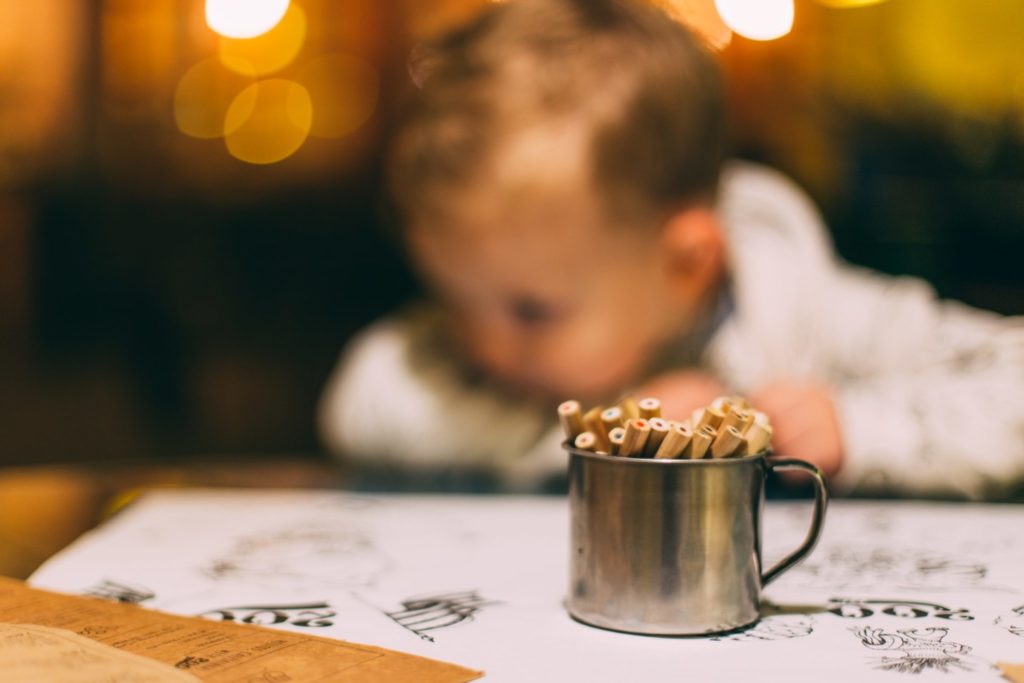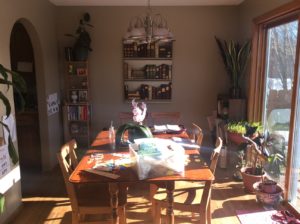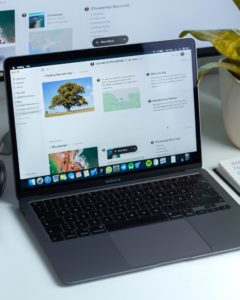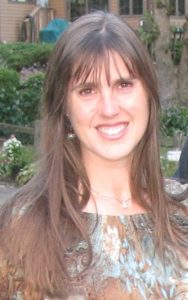
As Students and Telecommuters Cram Tables, an Ancient Song Creeps In
“Can I join you?”
Her eyes are skeptical, wondering, as she stares at the kitchen table. I don’t blame her.

Yellow highlighters, six sharpened pencils, and slips of paper sticking out of stacks of graduate-level books mix with sixth grade grammar pages, obliterating the world map below.
“Yes,” I assure her, sliding papers and school books to the far corner. “Daniel and I have to go downstairs anyway.”

Photo credit to Walling
My tall, dark-haired daughter gingerly places her laptop at one end of the table, while I slide her dad’s Masters of Divinity schoolbooks to the side. Morgan carefully unwinds her art tablet, and opens up her latest storyboard and illustration college piece she’s working on. My twelve year old bounds downstairs to start his math and I join him, a fresh cup of coffee in one hand, textbook and pencils in the other.
And I see it, how this pandemic changes everything. How spouses work from home, stepping away from the kitchen to make business phone calls. College students have exams and class lectures through Zoom video calls behind shut doors, and we all take turns at the kitchen table where warm sunshine offers the best light.

Sometimes sharing space is cozy and special. Other times it bubbles up conflict and the need for better communication.
“Is it almost done yet?” he had yelled a few days ago, his voice snaking down the stairs. Mark had laid out a semicircle of textbooks, all marked with paper scraps and tabbed with notes on the table below. Building an eleven page paper in assembled outlines and notes, he suddenly stopped. I can’t remember what prompted his halt but, in the lull, Daniel and I skipped downstairs, pulling up chairs to the computer desk behind his table. Coming from the computer, a man’s voice lectured on math’s multiplication common factors. The teacher spoke of finding the greatest common factor, and Mark’s patience reached his own greatest factor.
“How long until he’s done with math?” Mark wondered, and Daniel and I looked at each other trying to estimate how long math lessons took.
Conversations followed. Apologies, explanations, shared problem-solving, and the realization that this seems to be part of the new normal of this pandemic: sharing work spaces.
You too? Nine months into the coronavirus Covid19 pandemic changing life, we are still figuring out this new normal some days, especially now as cases skyrocket again across our nation and world. In addition to the more serious life-threatening and economic crises that are hitting people, we feel the effects of covid in smaller, day to day ways, like sharing tables for homework and hunting out quiet places to think.
Sitting beside Daniel again today as he tapped pencil against his purple binder and calculated the greatest common factor of 12 and 15, I grabbed my own book and pencil and dug into learn.
In the Bible book of Habakkuk, the Jewish prophet stands up and asks bold questions to God, and I underline words and listen, taking it in. I love that he asks God the questions we all wonder. He posits, “Why is there all this evil in the world, God? Why do you allow it?” Habakkuk also wonders, “Why are you doing it THAT way, God? Why are you using them?” and then he waits. Habakkuk steps back, saying, “I will look to see what he will say to me and what answer I am given...” And one of the students in my Monday night Cover to Cover Bible Survey class nailed it. “I love that he says he’ll wait for God’s answer. Too often, I think we just walk away.”
Her sentence hung in the air and I nodded, my breath fogging up the plastic face shield. “I agree, Lynn. I love that he asks the hard questions and then he waits for God’s response. Too often I think I can ask a question and then forget to pay attention, missing God’s answer.”
My classmates and I talked more, nodding and thinking, and then we hit Habakkuk’s last paragraph. Despite the difficult circumstances around him: economic hardships, and political and global upheavals, Habakkuk took a steadying breath. Something God told him gave him strength despite his still feeling weak at the latest news of war.
Habakkuk took up ink and composed a song, already hearing the stringed instruments he would use.
“Though the fig tree does not bud
and there are no grapes on the vine,
though the olive crop fails,
and the fields produce no food
though there are no sheep in the pen
and no cattle in the stalls,
yet I will rejoice in the Lord,
I will be joyful in God my Savior.
The Sovereign Lord is my strength…” (Habakkuk 3:17-19a).
Despite the circumstances in Habakkuk’s world, he knew Who was his steady source of Hope, of Joy, of Strength… and we can too.

If you are not receiving my posts by email yet, welcome! Simply enter your email address in the box under my bio at the top right of the page or at the bottom of any website page. Be part of any special invitations and don’t miss a post!
Jennifer speaks often at MOPS/MomsNext groups, at the Set Apart conference, at churches, retreats, camps, home school co-ops and more. She would be honored to have you join the 900+ people who have been getting to know each other over the last 14 years or so here and doing life together.
Josh trying to work and homeschool cause craziness over here too. This world is crazy right now. Glad my rock is Jesus and my hope is in him. Like you said…God gives us the strength we need to get through this.
Hi Liz,
I’m grinning with you at the image of Josh working from home, and you and the kids doing school spread all throughout the house too. 🙂
Grinning with you,
Jennifer
https://www.jenniferdougan.com